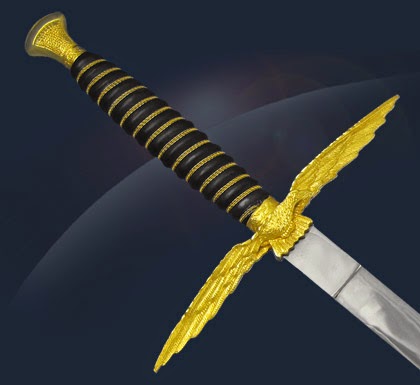A Claymore is a word which is associated with “great military swords” and was patented in the year 1772. At that
time the big swords which were used by two handed were considered as Claymore sword. Broadly, A Claymore can be considered as a
Scottish type of the late medieval long swords which were applied for two
handed use. These swords were basically being used between 15th to
17th centuries mainly by the Scottish & British military
personnels.
Today I am here to brief about the
Origin of the Scotiish Claymore swords and what were the various changes to the
definition of the Claymore with the time change.
The designed of the Scottish swords
are mainly recognized as Claymores and in fact the great Scottish swords which
were known as Claymore were somewhat smaller as compared than the contemporary
swords in Scotland running around 55 inches in all.
Actually the reality is that, the
Claymore was used in the operations from early as the 14th century
and the term of “Claymore” was applied at the beginning of the 17th
century. It is characterized as having a
cross hilt of forward-sloping quillons with quatrefoil terminations. In 1911 Encyclopædia
Britannica judged that the term “Claymore” was wrongly applied to the “basket-hilted
sword”.
After that, the “basket-hilted sword”
was contemporaneous attested in 1773 as the broad long sword now called as the
Claymore (the great sword). The Claymore was considered as an awesome weapon on
the war fields and they were having an amazing reach (as much as 60 inches,
which is the length of a standard Claymore) made it very difficult for the
opponent to close with the welder.
After the 17th century ,
the Claymore has begun to be used in parts of England & Scotland and they
were referred to as basket-hilted swords. These swords were considered as a mark of
distinction by the Scottish Officers over the other more slender Sabres after
the act of Union in 1707 when the Scottish & English regiments were integrated
together.
Legend has it that a Claymore was
hurled into the field of battle, toward an opposing army before combat, to
signify that the Scottish troops were ready to fight. No real evidence of this,
but it’s cool and fits the Highlander idiom, so we thought we’d pass it along.
And one more thing I want to specify,
the heavy military swords were seen as a symbol of physical strength and
prowess, and a link to the historic Highland way of life. Although these swords
were no longer recognizable as the historical Claymore and they are considered
as the Broadsword of that era and so were referred to using the same word.
These Scottish Claymore were used in
the Scottish regiments till the 18th Century.
So, that’s my take on the origin of
the Scottish Claymore swords.
I also want to conclude that there
might be several information and facts about these Scottish Claymore swords which
I might have skipped. But I have made my own assumption for these facts and
information would be enough for a newbie to get some crucial information
regarding these Claymore.
Today there Claymore swords are used
as presentation
swords and ceremonial
swords in the National day or any other military
ceremonies. There are many places where you can buy swords online but the thing is that you should check the
history before getting the same. I would definitely appreciate any views of
yours in the above context or any points I might be missing.



The claymore sword is the most famous swords in terms of military and medieval swords.
ReplyDelete